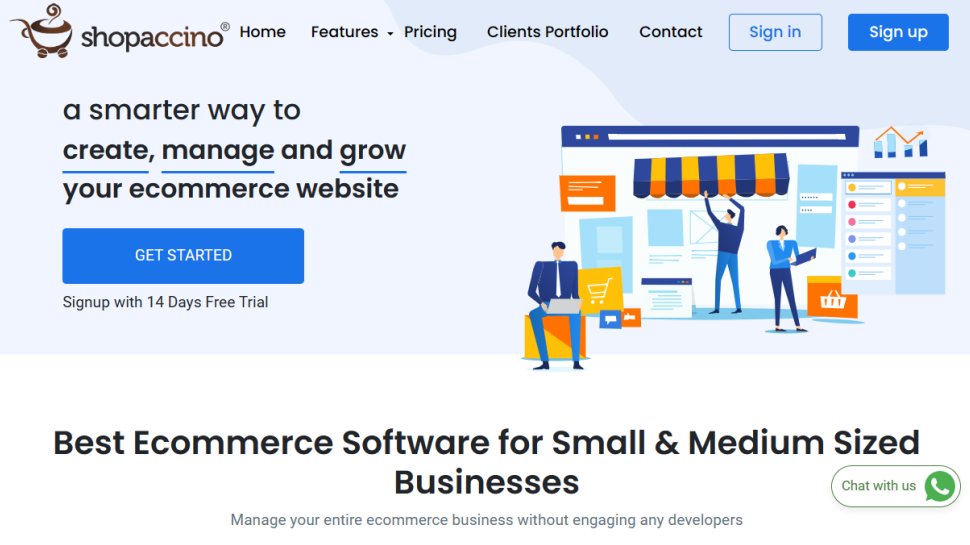Best shopping cart software of 2026
Take payments and orders online

We list the best shopping cart software, to make it simple and easy to take payments and orders online.
The online marketplace has grown by leaps and bounds over the past few years especially, to the point where online shopping in some form is now the norm for most people.
While this means that businesses can benefit from setting up one of the best ecommerce platforms to work for them it's also essential to ensure they have the best in shipping cart software.
As with all software, not all shopping carts are the same, from anything such as pricing to features to customization.
For example, if you want to set your own shopping cart software up, you'll need ecommerce web hosting to be able to cater for your shopping website, and ensure you add a credit card processing option to take payments online. This isn't necessary as difficult as it sounds if you already have some experience in selling online.
However, many people will prefer an off-the-shelf solution in which everything is already provided. These ready-made plans can be more expensive than taking the DIY route, but they're often a smart choice for e-commerce newbies, as they remove most of the technical hassles and allow you to focus on building a great web store.
We've tried out all of the most popular shopping carts and put together a list of what we think are the best out there. Therefore below please find our list of what we think is the best shopping cart software currently available.
We've also listed the best ecommerce tools.
The best shopping cart software of 2026 in full:
Why you can trust TechRadar
Best shopping cart software overall
Reasons to buy
Reasons to avoid
Shopify began life in Canada, with two young men looking to sell their snowboards online. Dissatisfied with the options on offer at the time, they built a platform of their own.
The results have been nothing less than spectacular. Shopify now claims to support millions of merchants across 170+ countries worldwide, who together are responsible for $444 billion of economic activity, and 10% of all US ecommerce.
Shopify's appeal is all about its mix of power and ease of use. Professional templates and a drag-and-drop store builder mean even total beginners are able to get started immediately. But Shopify's own app store can extend your site with all the advanced design, marketing, selling, payment handling, shipping and other advanced features you can imagine.
Pricing is a particular highlight, with Shopify offering everything from a Starter plan for selling through social and messaging apps, to a small business-friendly Basic plan, and plan for if you've Amazon levels of business.
And if you're still in doubt, Shopify has even more ways to help. You can try out the full service for three days, no credit card required. And if you do sign up, then every plan gives you the first three months for just $1 a month. Choose the monthly billing option and you can have 90+ days to test Shopify for just $3: works for us.
Read our full Shopify review.
Best versatile shopping cart software
2. Shopaccino
Reasons to buy
Reasons to avoid
Shopaccino offers some of the most versatile shopping cart software available today. The range of payment methods available is very versatile and includes VISA, Mastercard, PayPal, COD (Cash on Delivery), and bank transfer. The excellent interface can also automatically calculate tax on transactions.
Shopaccino has an integrated module for managing shipping, which allows you to set the areas where your store can deliver and manage postage costs. If your online shop offers free shipping, the module can implement this too. Customers can also create a virtual 'Wishlist' for products they may want in the future.
The store interface is simple and easy to use, allowing merchants to upload images and product information without any complications. There are even Android and iOS versions of the software to allow you to manage products on the fly. Shopaccino also offers online support.
The software is free to try for 14 days, after which you will need to subscribe to one of their paid plans. These vary according to the number of resources and number of users you require, and which range of features you require.
Best shopping cart software for third-parties
Reasons to buy
Reasons to avoid
Ecwid began life as a service for adding a shopping cart to an existing site, but, these days, you can also use it Shopify-style to build a complete web store from scratch.
Whatever approach you're taking, Ecwid has all the tools you need to deliver ecommerce success. You can sell via TikTok, Instagram or Facebook, connect to marketplaces including Amazon, eBay or Google Shopping, even connect to Point-Of-Sale in your own physical store. Automated ads help drum up business, there are over 100 payment gateway and shipping integrations, and the Ecwid App Market supports adding all kinds of advanced extras.
Ecwid's free tier is a highlight. This only supports selling up to 5 products, but it's a simple way to open a small web store on an existing site. The Store Builder gets you up and running quickly, there are easy payment options, and support for advertising on Google, Facebook and more.
If you're tempted, check out the free plan to get a better idea of how Ecwid works.
Read our full Ecwid review.
Best shopping cart software for WordPress
Reasons to buy
Reasons to avoid
Woocommerce is a free shopping cart plugin for WordPress, to allow you to install a fully-functioning eCommerce site to any WordPress install.
Set up is simply a matter of installing the plugin directly through WordPress, but although you'll be able to set up products and shipping rates, along with shopping categories and most basic features, you will also need to install additional addons to provide full functionality. Many of these are available directly through the Woocommerce website, though others may be sold on third-party websites.
There is a wide range of addons available, not least including payment processors such as Paypal, Sagepay, and Stripe, as well as a large selection of others for adding different levels of functionality to your shop. This can include everything from inventory management to stock control. A number of integrations are also available, such as Mailchimp for email marketing and Xero for accounting.
Although add-ons tend to have a cost associated with them, that in itself isn't too bad as most add-ons tend to be relatively cheap, measured in tens of dollars rather than hundreds of dollars. Some have a one-cost price, but others have annual renewal fees to maintain support and upgrades, but again this is minimal.
All in all this makes Woocommerce very easy to set up and administrate, and also very cheap to set up, which makes it one of the best contenders for those looking to ease themselves into starting an online retail business, whether for physical products or even digital ones.
Read our full Woocommerce review.
We've also listed the best payment gateways.
Best shopping cart software FAQs
What is shopping cart software?
If your website offers any sort of product or service in exchange for money, it's very likely that you're going to need in-built e-commerce functionality that allows you to accept payments online.
Shopping cart software - like those featured in this list - essentially allows website visitors to select the products or services they want from a digital storefront.
These products are then accumulated in one easy-to-access area typically known as the shopping cart, before a customer pays for the items in during checkout. It is here that users will be able to securely input their personal details, delivery address (if required), and payment information.
The more sophisticated shopping cart software will also be able to automatically tally-up additional fees such as delivery costs and taxes, or implement discount codes or coupons.
How to choose the best shopping cart software for you
The first thing to consider when weighing up your options on the best shopping cart software, is the platform your website uses. Some of the shopping cart software listed above are only compatible with certain platforms. WooCommerce, for example, can only be used with WordPress websites.
Once you've narrowed down the shopping cart software available to you based on platform, the next thing to consider is what features you'll want your shopping cart to have. Will you need it to be able to automatically calculate delivery charges or taxes? Will you need software that can manage recurring subscriptions? Will you need software that works with a specific payment gateway (e.g. PayPal or Stripe?).
Getting these answers will give you a very specific idea of the sort of shopping cart software required for your site, before considering the final conundrum. Cost. Do you have budget to spend a one-off fee for sophisticated software? Would you rather use software that takes a percentage of transactions? Or are you on the lookout for low-cost or free options? Fortunately, we cover all of the options in our list above.
How we tested the best shopping cart software
In our list of the best shopping cart software we've narrowed down a vast choice of options down to what we believe are the top five. We've done this by road testing the software in several key areas.
For shopping cart software to be effective, it needs to work with as wide a range of payment methods as possible, from major credit card suppliers to mainstream online processors like PayPal and Stripe. We've noted where this is the case.
Given the global world we now live in, software that will work in a wide range of countries has also been prioritised on this list, including features related to calculating shipping costs and taxes.
And while much of the focus has been on the customer experience, it's of course important that shopping cart software is also easy-to-use and intuitive for the website owner, which is another factor we've taken into consideration. We've also listed where try-before-you-buy schemes are offered by the software providers.
Read more on how we test, rate, and review products on TechRadar.
Get in touch
- Want to find out about commercial or marketing opportunities? Click here
- Out of date info, errors, complaints or broken links? Give us a nudge
- Got a suggestion for a product or service provider? Message us directly
- You've reached the end of the page. Jump back up to the top ^
Sign up to the TechRadar Pro newsletter to get all the top news, opinion, features and guidance your business needs to succeed!
Nate Drake is a tech journalist specializing in cybersecurity and retro tech. He broke out from his cubicle at Apple 6 years ago and now spends his days sipping Earl Grey tea & writing elegant copy.



